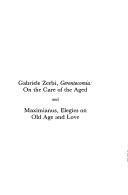| Listing 1 - 3 of 3 |
Sort by
|
Book
ISBN: 9780367200596 9780367729042 9780429259395 Year: 2019 Publisher: London Routledge
Abstract | Keywords | Export | Availability | Bookmark
 Loading...
Loading...Choose an application
- Reference Manager
- EndNote
- RefWorks (Direct export to RefWorks)
Gallus Reborn is the first comprehensive study of the publication history and reception of the works that have been attributed to Gaius Cornelius Gallus, first canonical Roman elegist, friend of Virgil, and ‘missing link’ in Roman literary history.Gallus was a widely read and frequently imitated author from the Renaissance onwards, when he overcame the disadvantage of having no surviving works by putting his name to a substantial body of pseudepigrapha: misattributed, faked or forged poems. This monograph asks what Gallus was like, during that phase of his existence; how was he read, and by whom; and what impact did he have on literary history?Combining close readings of the texts with a comparative overview of their wider reception, Gallus Reborn will interest scholars and advanced students of classical reception, Neo-Latin, comparative literature and early modern studies.
Maximianus, --- Appreciation. --- Criticism and interpretation.
Book
ISBN: 1316421791 1108916775 Year: 2021 Publisher: Cambridge : Cambridge University Press,
Abstract | Keywords | Export | Availability | Bookmark
 Loading...
Loading...Choose an application
- Reference Manager
- EndNote
- RefWorks (Direct export to RefWorks)
The oration presented in this volume is critical to our knowledge of Constantine's early career and covers Maximian's rebellion, Constantine's claim of descent from Claudius II and his vision of Apollo. Written in AD 310, two years before Constantine's capture of Rome and his acceptance of Christianity, the speech gives a unique insight into the evolution of an imperial persona. This commentary examines the literary context of the panegyric and the role of the classical literary and rhetorical tradition in the recreation of Constantine's image. From the outset, the orator praises Constantine as separate from the imperial college: a deus praesens, god manifest, to the people of Gaul. He uses Lucan and Caesar to link Maximian's bid for power with the civil war between Caesar and Pompey while Vergilian allusion associates Constantine with Augustus.
Speeches, addresses, etc., Latin --- History and criticism. --- Maximian, --- Diocletian, --- Diocletianus, --- Dioklecijan, --- Diokletian, --- Diokghetianos, --- Diocleziano, --- Diocleciano, --- Cayo Aurelio Valerio Diocleciano, --- Massimiano Herculius, --- Massimiano, Marco Aurelio Valerio, --- Maximianus, Aurelius Valerius, --- Maximianus, Marcus Aurelius Valerius, --- Panegyrici Latini. --- Duodecim panegyrici Latini --- Panegyrici veteres --- Oratores panegyrici --- Rome --- Rim --- Roman Empire --- Roman Republic (510-30 B.C.) --- Romi (Empire) --- Byzantine Empire --- Rome (Italy) --- History --- Sources.

ISBN: 0871691825 9780871691828 Year: 1988 Volume: 182 Publisher: Philadelphia (Pa.): American philosophical society,
Abstract | Keywords | Export | Availability | Bookmark
 Loading...
Loading...Choose an application
- Reference Manager
- EndNote
- RefWorks (Direct export to RefWorks)
Geriatrics --- Older people --- Aging --- Elegiac poetry, Latin --- Early works to 1800. --- Health and hygiene --- Translations into English. --- Aged --- -Aging --- -Elegiac poetry, Latin --- -Geriatrics --- -Medicine --- Gerontology --- Latin elegiac poetry --- Latin poetry --- Age --- Ageing --- Senescence --- Developmental biology --- Longevity --- Age factors in disease --- Aging people --- Elderly people --- Old people --- Older adults --- Older persons --- Senior citizens --- Seniors (Older people) --- Age groups --- Persons --- Gerontocracy --- Old age --- -Early works to 1800 --- Early works to 1800 --- Translations into English --- Diseases --- Physiological effect --- -Health and hygiene --- -Latin elegiac poetry --- Medicine --- Health and hygiene&delete& --- Geriatrics - Early works to 1800. --- Older people - Health and hygiene - Early works to 1800. --- Aging - Early works to 1800. --- Elegiac poetry, Latin - Translations into English. --- Geriatrics. --- Gerontology. --- Gérontologie --- Personnes âgées --- Psychology. --- Care --- Care. --- Health and hygiene. --- Soins --- Maximianus, --- Zerbis, Gabriele de, --- Elegiae (Maximianus).
| Listing 1 - 3 of 3 |
Sort by
|

 Search
Search Feedback
Feedback About UniCat
About UniCat  Help
Help News
News